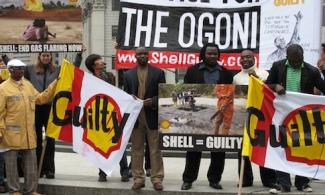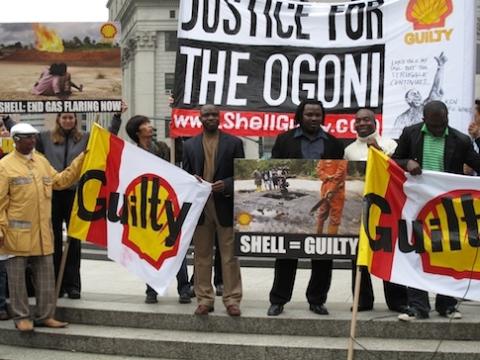
In a report published on Tuesday, entitled “A Criminal Enterprise? Shell’s Involvement in Human Rights Violations in Nigeria in the 1990s,” the human rights organization revealed that Shell encouraged the Nigerian military to use force to silence natives of Ogoniland who protested oil pollution caused by Shell’s activities in the region.
Amnesty International has called on the governments of Nigeria, the United Kingdom, and the Netherlands to investigate oil giant Shell over its involvement in atrocities committed by the Nigerian military government in Ogoniland in the 1990s.
In a report published on Tuesday, entitled “A Criminal Enterprise? Shell’s Involvement in Human Rights Violations in Nigeria in the 1990s,” the human rights organization revealed that Shell encouraged the Nigerian military to use force to silence natives of Ogoniland who protested oil pollution caused by Shell’s activities in the region.
Among the atrocities committed by the Nigerian military was the execution of nine activists, including Ken Saro-Wiwa, who led the protests against Shell.
“The evidence we have reviewed shows that Shell repeatedly encouraged the Nigerian military to deal with community protests, even when it knew the horrors this would lead to – unlawful killings, rape, torture, the burning of villages,” said Audrey Gaughran, Director of Global Issues at Amnesty International.
According to the report, Shell went as far as providing material support to the Nigerian military in order to assist it in its campaign in Ogoniland.
“In the midst of this brutal crackdown Shell even provided the military with material support, including transport, and in at least one instance paid a military commander notorious for human rights violations. That it has never answered for this is an outrage.
“It is indisputable that Shell played a key role in the devastating events in Ogoniland in the 1990s, but we now believe that there are grounds for a criminal investigation. Bringing the massive cache of evidence together was the first step in bringing Shell to justice. We will now be preparing a criminal file to submit to the relevant authorities, with a view to prosecution,” the report said.
Internal memos and minutes from meetings made available to Amnesty International revealed that Shell lobbied Nigerian government officials for military support in order to protect its business interests. Shell also provided logistical and financial assistance to military and police personnel, according to the report.
In one instance in October 1990, Shell requested assistance from the Mobile Police in Umuechem village in order to protect them from peaceful protesters. The police proceeded to attack the village, killing no fewer than 80 people and burning down 595 houses.
Despite having knowledge of this carnage, Shell continued to request protection from the Nigerian police and military.
In April 1993, for example, 11 people were shot in the village of Biara after Shell requested protection.
“On a number of occasions, Shell’s request to the government for help tackling what it termed the ‘Ogoni issue’ was followed by a new wave of brutal human rights violations by the military in Ogoniland. It is difficult not to see causal links – or to suppose that Shell was not aware at the time how its requests were being interpreted,” said Audrey Gaughran.
“Sometimes Shell played a more direct role in the bloodshed – for example by transporting armed forces to break up protests, even when it became clear what the consequences would be. This clearly amounts to enabling or facilitating the horrific crimes that followed.”
Amnesty International therefore called on the government of Nigeria and Shell’s home governments, the United Kingdom and the Netherlands, to launch an investigation into Shell and former employees of the oil company who held “decision-making and/or supervisory” positions for complicity in human rights violations committed in Ogoniland in the 1990s.
